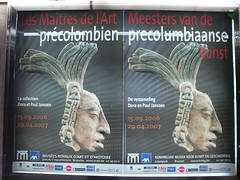The Guadalajara city derby ended with a nice 3-1 result for my beloved Chivas. Alberto “El Venado” Medina had a very good performance, scoring 2 goals.
La situación de Oaxaca
Después de ya varios meses fueron desalojados ayer los maestros de la APPO (Asamblea Popular del Pueblo de Oaxaca) del centro de la ciudad de Oaxaca por la Policía Federal Preventiva. Por desgracia, hay reportes de que hubo un muerto. El conflicto empezó con un plantón en mayo porque los maestros de la entidad demandaron mejores salarios, pero sufrió una escalada porque en un enfrentamiento entre éstos y la policía estatal hubo un muerto, con lo cual los maestros exigieron la renuncia del gobernador de Oaxaca, Ulises Ruiz, del PRI. La capital del estado ha estado tomada desde finales de mayo, con las consecuentes pérdidas económicas en una entidad que depende mucho del turismo nacional y extranjero (por ejemplo, el festival de la Guelaguetza fue cancelado). Ahora que se ha reestablecido el orden en la ciudad sería buena idea forzar la renuncia del gobernador que no gobierna para garantizar el cambio en una entidad que es de las más rezagadas del país.
The fence
I posted this Paco Calderón cartoon last week, and this morning I was thinking about this situation. I believe in following the laws of the country you reside in regardless of whether you agree with them or not, but I think the current situation is rather tragicomic. If the current US government were really serious about curbing illegal immigration to their country, they would simply enforce the laws they have regarding the prohibition of employment of people without papers (as it is done, for example, in Finland). The idea of building a fence simply smells of populism to me, trying to appease the anti-immigration constituency before the Congress elections this month.
This doesn’t mean that the governments of the countries of origin of those illegal immigrants (namely Mexico) should forget their responsibility to get jobs for their own population by ensuring the conditions for job creation by private enterprises is there. It would be unsustainable to pay for those jobs with taxes, especially since currently the tax income in Mexico is so low compared to GDP.
A Paco Calderon cartoon for the weekend
Plastilina Mosh
Another post in the series of Rock en Español. Plastilina Mosh is a duet from the northern city of Monterrey in Mexico. Their style has been described as alternative rock (I think it’s anything but) and they tend to mix Spanish, English and other languages in the same song. They are usually associated with the “Nintendo generation” as that is how both band members met. I bought one of their CDs in Japan, of all places. Some examples of their music below.
Peligroso Pop (Hola Chicuelos, 2003)
Mr. P Mosh (Aquamosh, 1998)
Afroman (Aquamosh, 1998)
Monster Truck (Aquamosh, 1998)
Te lo juro por Madonna (Hola Chicuelos, 2003)
Los Oxidados (Hola Chicuelos, 2003)
Millionaire (Tasty, 2006)
More information from Wikipedia or the official site.
Children of Men
We saw this movie during the weekend, and I have to say, it really got me thinking. I won’t spoil it for you, but it had a lot of relevance to me given that I’m a person who has been living abroad almost one quarter of my life. Absolutely recommendable.
Precolumbian art exhibitions in Europe
I’m very glad to see that there is a number of Mesoamerican precolumbian art exhibitions doing the rounds in Europe during the past years. At least there are initiatives to educate them about the existence of ancient civilisations such as the Aztecs or the Mayas.
The most amazing exhibition I saw outside of the Americas on this subject was the Aztecs exhibition in Berlin (which was also in London and Tokyo). However, if you are really interested in these two civilizations, there is no better option than going to the National Anthropology Musem in Mexico City for a concise view. You can also visit the different ruins in the country if you want to have a better idea of how did they live, like Chichén Itzá or Teotihuacán.
Globalisation ≠ Americanisation
I have seen that a lot of the debate regarding globalisation as such is that we’re all becoming “Americanised”. Whilst it is true that many of the global brands are American, and that a sizeable part of the media we consume is also from the U.S, there is a lot of interaction that doesn’t involve them, and that would even go against their interests. English, however, is one of the platforms that we use for international communication, like the Latin of old. The problem is that native English speakers have no incentive for learning a foreign language, so their horizons are a little bit more limited in the beginning.
Peter Pan
I saw a programme yesterday on the BBC about Peter Pan, and I have to say I was transported back to my childhood. I was a big fan of the animated movie when I was a small kid, and I have to admit it influenced me a little in the sense that I try to keep a positive approach to life, even though I’m an adult now.
Caifanes/Jaguares
Continuing with the series of posts of Spanish-Language Rock, Caifanes was the band that revived Rock in Mexico in the late 80’s. They started as a sort of Mexican The Cure but started bringing in some influences from traditional music, which are noticeable in some of their songs. After a series of hits, they disbanded in 1995 because of some problems between the Saúl Hernández, the lead singer, and Alejandro Marcovich, the lead guitar. However, Hernández continued and created a band called Jaguares. Some videos below:
Afuera (El Nervio del Volcán, 1994) Notice the prehispanic influence in the guitar solo
Mátenme porque me muero (Caifanes, 1988)
La Negra Tomasa (Caifanes, 1988)
La célula que explota (El diablito, 1990) Notice the mix of rock with mariachi
Nubes (El Silencio, 1992)
No dejes que (El Silencio, 1992)
La llorona (El Nervio del Volcán, 1994)
Aquí no es así (El Nervio del Volcán, 1994)
Quisiera ser alcohol (El Nervio del Volcán, 1994)
Dime Jaguar (El Equilibrio de los Jaguares, 1996)
Detrás de los Cerros (El Equilibrio de los Jaguares, 1996)
Fin (Bajo el Azul de tu Misterio, 1999)
Tú (Bajo el Azul de tu Misterio, 1999)
Como Tú (Cuando la Sangre Galopa, 2001)
La Vida no es igual (Cuando la Sangre Galopa, 2001)
Te lo pido por favor (El Primer Instinto, 2002) Originally a ballad by Juan Gabriel




